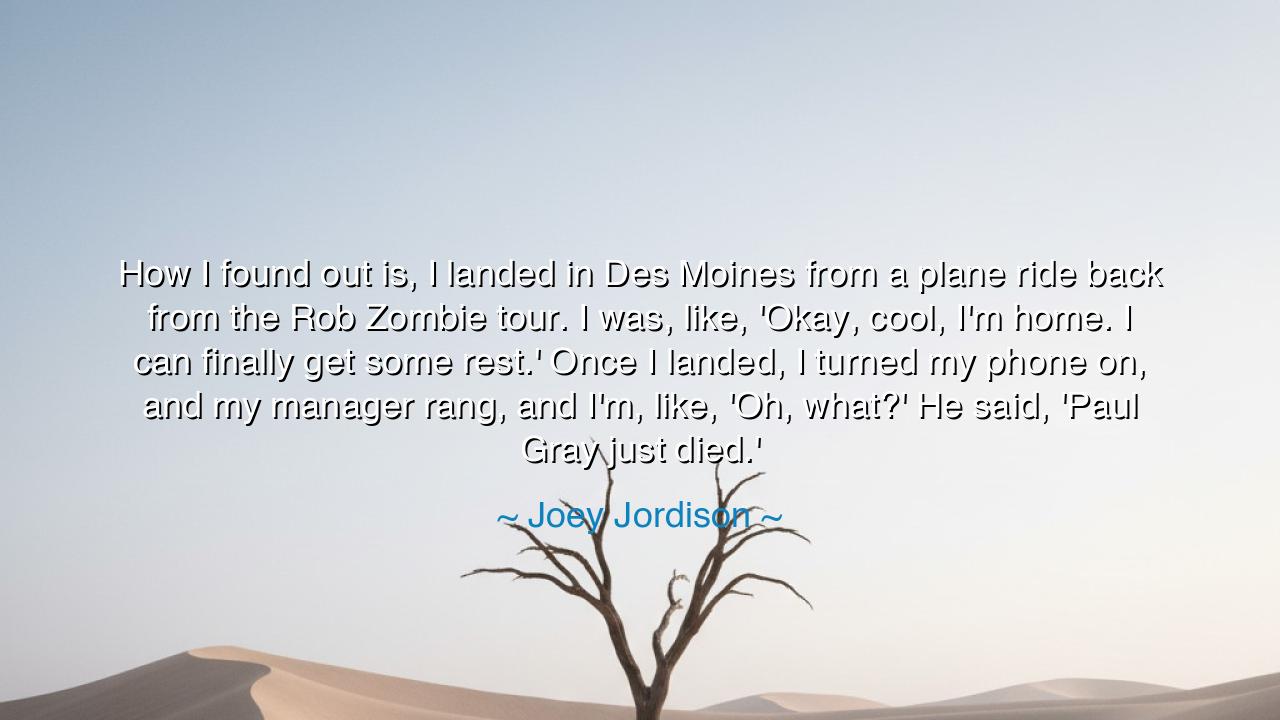
How I found out is, I landed in Des Moines from a plane ride back
How I found out is, I landed in Des Moines from a plane ride back from the Rob Zombie tour. I was, like, 'Okay, cool, I'm home. I can finally get some rest.' Once I landed, I turned my phone on, and my manager rang, and I'm, like, 'Oh, what?' He said, 'Paul Gray just died.'






In the words of Joey Jordison, the legendary drummer and co-founder of Slipknot, we encounter a moment of raw humanity wrapped in the silence of loss: “How I found out is, I landed in Des Moines from a plane ride back from the Rob Zombie tour. I was, like, 'Okay, cool, I'm home. I can finally get some rest.' Once I landed, I turned my phone on, and my manager rang, and I'm, like, 'Oh, what?' He said, 'Paul Gray just died.’” These words, simple yet searing, capture the moment when peace turns to grief, when the comfort of returning home is shattered by the sound of tragedy. Jordison, in recounting how he learned of the death of his bandmate and brother-in-arms Paul Gray, reveals not only the pain of loss but the fragility of life itself — how swiftly joy can crumble into sorrow, how even the strongest hearts are humbled by fate.
The meaning of this quote reaches beyond the world of music. It speaks of that universal moment that comes to all who live long enough to love deeply — the moment when one is caught between relief and ruin, when time itself fractures. Joey’s words are the utterance of a soul struck without warning. His homecoming, which should have been a moment of rest after long toil, becomes instead a confrontation with mortality. This is the cruel rhythm of life: the heartbeat of joy and grief, forever alternating, never predictable. His story reminds us that tragedy often enters quietly, through the ring of a phone or a knock at the door, and that no one, no matter how strong, is immune to the sudden descent of sorrow.
To understand the origin of this grief, one must know the bond between Joey Jordison and Paul Gray. Together, they forged the sound of Slipknot, one of the most powerful and primal forces in modern music — a band that transformed pain into rhythm, chaos into unity. Paul was not merely a bandmate but a brother, the emotional anchor of a group built upon darkness and defiance. When Paul died in 2010, it was as though the heart of the band had stopped beating. For Joey, who had shared years of struggle, creation, and catharsis with him, the loss was not just professional — it was deeply spiritual. His quote is not a mere recollection of news; it is the sound of a soul remembering the instant its world changed forever.
The ancients, too, spoke of such moments. When Achilles learned of Patroclus’s death, his rage and sorrow were so great that he could not eat, could not sleep, could not think of anything but vengeance and grief. His cry shook the heavens. Achilles’ mourning, like Joey’s, was not only for a friend but for a part of himself. In each of these men — the warrior and the musician — we see that love, when bound by shared purpose, transforms loss into something elemental. The death of a comrade becomes the death of innocence, and what remains is a sacred duty: to carry forward what the other began.
Yet there is also a quiet, sacred beauty in Jordison’s remembrance. Beneath the shock, beneath the anguish, there is an unspoken reverence — a recognition that though death has taken Paul’s body, his spirit endures in the music they created together. This is what the ancients called anamnesis — the act of remembering as resurrection. Each time a Slipknot song roars through the crowd, each time a drumbeat echoes like thunder, Paul lives again. Joey’s grief, though heavy, becomes the forge of immortality. Through his pain, he ensures that the memory of his brother does not fade, but grows stronger in sound and legacy.
From his words we draw a lesson about the nature of grief and love. To love is to risk loss, but to lose is not to be defeated. When death comes suddenly, it tempts the heart to despair, to retreat from the world. But the path of the strong — the path Joey walked — is to turn pain into tribute, sorrow into song. It is to honor those we have lost not by silence, but by creation, by courage, by living as they would have wanted us to live. The wise of old said, “The fire that consumes also purifies.” In grief, our hearts burn, but from the ashes rises a clearer understanding of what truly matters.
So, let this quote stand not only as a chronicle of Joey Jordison’s heartbreak, but as a reminder to all who have lost: life can change in a single breath, but what is bound in love can never truly be severed. When the call of death comes, may we remember that the truest homecoming is not the place we rest our heads, but the people whose spirits dwell within our hearts. For even when the music stops, its echo endures — and through remembrance, we keep both the melody and the soul alive.






AAdministratorAdministrator
Welcome, honored guests. Please leave a comment, we will respond soon